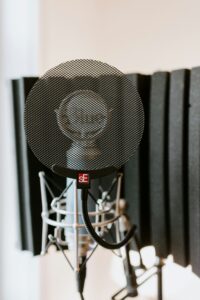 Vocal training is a lifelong process. It’s necessary to have discipline and awareness in order to learn and maintain healthy vocal techniques. As a voice actor, your body and voice are your instruments and you must be consistently practicing, training your voice, and keeping your instrument in the best “shape” possible. As a voice-over professional, I personally like to think of myself as an athlete, if I don’t train and go to the gym to maintain my form, my skill set will weaken. Below are the areas of focus I believe are imperative to classically train your voice.
Vocal training is a lifelong process. It’s necessary to have discipline and awareness in order to learn and maintain healthy vocal techniques. As a voice actor, your body and voice are your instruments and you must be consistently practicing, training your voice, and keeping your instrument in the best “shape” possible. As a voice-over professional, I personally like to think of myself as an athlete, if I don’t train and go to the gym to maintain my form, my skill set will weaken. Below are the areas of focus I believe are imperative to classically train your voice.
Your Body
Your entire body is involved in voice acting, it’s the vessel through which we convey the text of a script. There are many physical demands put upon voice-over actors in the booth, including but not limited to: standing for long periods of time, hours of speaking in various characters for audiobooks, as well as conveying different volumes and character voices for animation or video games. As a voice actor, we must warm up our bodies and ensure they are free of tension when we are called upon to record in a booth for several hours. There are various physical techniques known for releasing tension such as Feldenkrais, Fitzmaurice Voicework, and Alexander Technique. I recommend you try one of the above techniques, or integrate a yoga and/or meditation practice into your lifestyle which helps free our muscles from unnecessary tension.
The Lips, The Mouth, The Tongue, The Teeth!
What do these all have in common? They help us with our diction and articulation in the booth. Voice-over coaching sessions can move quickly and sometimes actors are expected to deliver large amounts of text clearly and concisely in a short amount of time. It’s imperative that you’re ready for any tongue twisting text a client throws at you, so developing those articulators is required. You must train your voice so articulation and diction sounds clear, but also natural.
 Breath Support
Breath Support
I graduated from undergrad with a Bachelor of Music in Musical Theatre and breath support is something I continue to work on in my voice-over career. Breathing involves so many muscles: intercostal muscles, abdomen, and diaphragm (this is where tension will come through as your enemy). Yoga has really helped me find ease with my breath and taught me not to push or force the breath unnecessarily. I recommend working with a singing teacher on your breath support, and/or challenging yourself with long phrases (in singing or text) to develop good habits to sustain some of the phrases you will find in demanding copy. Shakespearean text is a great tool to train your voice and practice breath support due to his use of long phrases. If you’re consistently working on your breath support, you’ll soon find that long texts such as narration or audiobooks begin to feel effortless.
Resonators
It’s important to know the inner mechanics of sound throughout your body. Once your vocal cords vibrate to produce tone, that tone then resonates throughout various ducts and chambers. There is head resonance, mouth resonance, chest resonance, and nasal resonance. When you choose to explore all of the sound possibilities different resonation can produce, it will be extremely helpful in your vocal health and technique and in certain voice-over areas such as animation, video games, and audiobooks.
 Phrasing and Musicality
Phrasing and Musicality
I have found my music and ear training to be extremely helpful in my voice-over career. While you always want to sound natural, it’s necessary to hear varying inflections and to be able to adjust based on a casting director or client’s notes. Just as phrasing makes a big difference in playing a piece of music, the same can be said for speaking text in theatre, as well as voice-over copy. I recommend listening to music and various voice-over professionals use of phrasing and musicality with a more critical ear. It can be difficult to find a trusted singing teacher, but the right mentor can help you not only train your voice, but also train your ear, which is extremely helpful for a voice acting career.
These are a few books I have found helpful throughout my training:
Freeing the Natural Voice by Kristin Linklater
The Actor Speaks: Voice and the Performer by Patsy Rodenburg
Speak with Distinction by Edith Skinner
Also, don’t forget to join in the conversation and share your positive experiences about Such A Voice!





